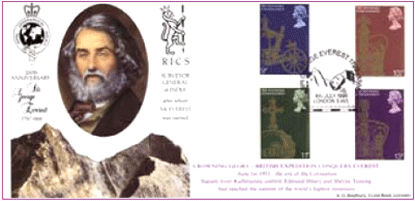| History | |
Illness and politics An acrimonious period
|
|
||||||||||
|
In 1837 Everest corresponded with his masters at the East India Company regarding the latest of his attacks of illness and the Directors were sufficiently worried by what he said to appoint a successor-designate as Surveyor General. A move about which Everest knew nothing until some months later. The person in question was Thomas Jervis, who, as far as Everest was concerned, was one of the persons least able to succeed him. On the strength of his appointment Jervis went to England and made the acquaintance of many influential persons which led to his being asked to address the British Association in 1838. It was when a copy of the Jervis’s paper was sent to Everest that he became furious and this resulted in an exchange of letters between him and the President of the Royal Society which amounted to some 150 pages. Unfortunately there appear to be no copies of any of the responses to Everest from the Royal Society. The spark that ignited the fury was that the tone of Jervis’s paper was written as if he were already Surveyor General. However this was further fuelled by a document supporting that paper and signed by 38 eminent scientists, most of whom were Fellows of the Royal Society. This document contained a series of recommendations on how survey in India could be improved, and concluded by suggesting that Major Jervis should avail himself of advice from various persons including Sir John Herschel, Mr Baily and Mr Airy. Everest’s responses direct to the Duke of Sussex, as President of the Royal Society, were acid in the extreme. He considered the various suggestions to be quite impractical in terms the staff and resources available. How could a group of such eminent gentlemen talk in such terms about a situation of which they had no first hand knowledge? In his letters Everest detailed at some length his work on the Arc, described all the hardships faced and the fact that there was “….not a single person [in India] who had the slightest experience of Geodetical operations, except three of my sub-assistants, who are not scientific men.”. He raised issues as to why the Royal Society had suddenly become interested in Arc measurement when it had not been interested when he commented on the problems with the Cape Arc of LaCaille? In one letter he took Sir John Herschel to task for implying that there were several aspects of the Arc survey that Everest had not done with regard to standards of measure and the use of thermometers yet Everest was able to refer him to his Report of 1830 wherein all those points had been detailed. By 1839 the letters had been widely circulated and it appeared that certain of the signatories involved were coming to feel that the circumstances surrounding the appointment of Jervis and everything connected with that were becoming an embarrassment. So much so that George Airy, the Astronomer Royal, considered that he may well have been under a misapprehension over the whole affair and this resulted in the East India Company indicating that the appointment of Jervis was dependent upon the death or resignation of Lieut Col. Everest. Everest had in effect won the battle but at the expense of considerable time, effort and strong words. He was even more determined to see the Great Arc to its conclusion come what may and that Jervis would have no part in that. The letters between Everest and the Duke of Sussex together, with various of the supporting documents, were published by Everest in 1839 as “A Series of letters addressed to His Highness the Duke of Sussex as President of the Royal Society, remonstrating against the conduct of that learned body.” Not only do they detail the arguments but hidden away in some of the letters are snippets of personal information regarding George Everest that have not been found elsewhere.
| ||||||||||

 For extended periods throughout his long stay in India Everest was plagued with illness. Not only did this result in the two periods of sick leave – S Africa in 1820 and England 1825 to 1830, but also shorter periods of severe incapacity when he did not leave India for better climates.
For extended periods throughout his long stay in India Everest was plagued with illness. Not only did this result in the two periods of sick leave – S Africa in 1820 and England 1825 to 1830, but also shorter periods of severe incapacity when he did not leave India for better climates.











 (5 votes, average: 4.80 out of 5)
(5 votes, average: 4.80 out of 5)



